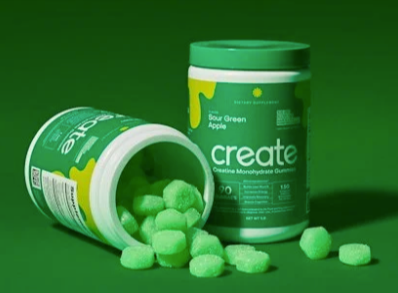Creatine for Muscles AND Brain Health
- livablemindset
- Jul 7, 2025
- 4 min read

When you hear the word creatine, what comes to mind? Probably gym bros looking to bulk up their biceps.
But here’s the thing — creatine isn’t just for people trying to build bigger muscles. It’s actually one of the most researched supplements in the world, and its benefits go far beyond the gym. In fact, creatine could be one of your brain’s best friends.
Creatine 101:
The Muscle Side
Creatine’s biggest claim to fame is how it helps your muscles perform, recover, and grow. It is a compound that’s naturally found in your muscles (and brain!). When you do short explosive movements like lifting weights, sprinting, or any short burst of activity, your muscles rely on ATP (adenosine triphosphate), your cell's main energy source. Creatine helps rapidly replenish ATP, so you can perform better on your next rep or sprint. Countless studies show that creatine helps increase maximal strength, power output, and endurance - which means more reps, heavier lifts, or just feeling less gassed after that intense workout.
Creatine also helps draw water to your muscle cells making them more hydrated and volumized, leading the cells to be able to synthesize new muscle proteins better. Which is just a fancy way of saying - it allows the muscle cells to more effectively repair and grow by allowing more nutrients in and getting rid of the waste.
By allowing you to train harder and keep cellular energy high, creatine indirectly supports more muscle fiber stimulation and adaptation over time. Some research also shows it may reduce muscle damage and inflammation after tough workouts. Which, in regards to recovery, allows you to bounce back quicker between sessions.
Broken down, this means:
More power and strength - lift heavier, run faster, push harder
Improved muscle recovery - so you can train again sooner
Support actual muscle growth over time
And it does all this while being one of the most studied, safe, and effective supplements you can buy.
Creatine for your brain, too? Yep!
Here’s the exciting part. Your brain uses tons of energy — about 20% of your body’s total energy needs, even though it’s only 2% of your body weight. Neurons (brain cells) use ATP to send signals, recycle neurotransmitters, and keep everything functioning. Just like in muscle, creatine in the brain helps recycle ATP — your cell’s immediate energy source. Under stress, heavy thinking, lack of sleep, or aging, your brain’s energy demands go even higher. Creatine can help buffer this energy dip to help keep your brain running smoothly.
Research is is still growing, but is showing that creatine can help:
Sharpen working memory and short-term memory
Particularly helpful in demanding or stressful cognitive tasks.
In older adults or vegetarians (who often have lower baseline creatine), supplementation can noticeably improve memory performance.
Reduce mental fatigue
People taking creatine report less feeling of “brain drain” after tasks requiring intense concentration.
Some studies show it helps maintain cognitive performance after sleep deprivation.
Support brain health as you age
Creatine may help protect brain cells from energy crises and oxidative stress, which is why it’s being researched in conditions like Parkinson’s, ALS, and mild cognitive impairment.
Mood & Resilience to Stress
Early research is looking at creatine as a supportive add-on for depression, due to its role in brain energy metabolism and neurotransmitter balance.
Creatine as a Supplement: Who should consider creatine?
Creatine is generally safe for most people (though you should always check with your healthcare provider). It’s not just for young athletes. It might be a smart addition if you:
Do strength or high-intensity workouts
Have mentally demanding work or long study sessions
Are experiencing more fatigue or brain fog
Want to support healthy aging (that's all of us, right?!)
Bottom Line: Creatine is a simple and affordable way to support both your muscles and your mind. It’s clean, widely studied, and surprisingly versatile.
Here are a couple of great options with third-party testing behind them:


Disclosure: This site contains affiliate links. I may earn a small commission at no extra cost to you. Thank you for your support!
Resources:
Sandkühler JF, Kersting X, Faust A, Königs EK, Altman G, Ettinger U, Lux S, Philipsen A, Müller H, Brauner J. The effects of creatine supplementation on cognitive performance-a randomised controlled study. BMC Med. 2023 Nov 15;21(1):440. doi: 10.1186/s12916-023-03146-5. PMID: 37968687; PMCID: PMC10647179.https://pubmed.ncbi.nlm.nih.gov/37968687/
Prokopidis K, Giannos P, Triantafyllidis KK, Kechagias KS, Forbes SC, Candow DG. Effects of creatine supplementation on memory in healthy individuals: a systematic review and meta-analysis of randomized controlled trials. Nutr Rev. 2023 Mar 10;81(4):416-427. doi: 10.1093/nutrit/nuac064. PMID: 35984306; PMCID: PMC9999677.https://pubmed.ncbi.nlm.nih.gov/35984306/
Antonio J, Brown AF, Candow DG, Chilibeck PD, Ellery SJ, Forbes SC, Gualano B, Jagim AR, Kerksick C, Kreider RB, Ostojic SM, Rawson ES, Roberts MD, Roschel H, Smith-Ryan AE, Stout JR, Tarnopolsky MA, VanDusseldorp TA, Willoughby DS, Ziegenfuss TN. Part II. Common questions and misconceptions about creatine supplementation: what does the scientific evidence really show? J Int Soc Sports Nutr. 2025 Dec;22(1):2441760. doi: 10.1080/15502783.2024.2441760. Epub 2024 Dec 25. PMID: 39720835; PMCID: PMC11703406.https://pubmed.ncbi.nlm.nih.gov/39720835/




Comments